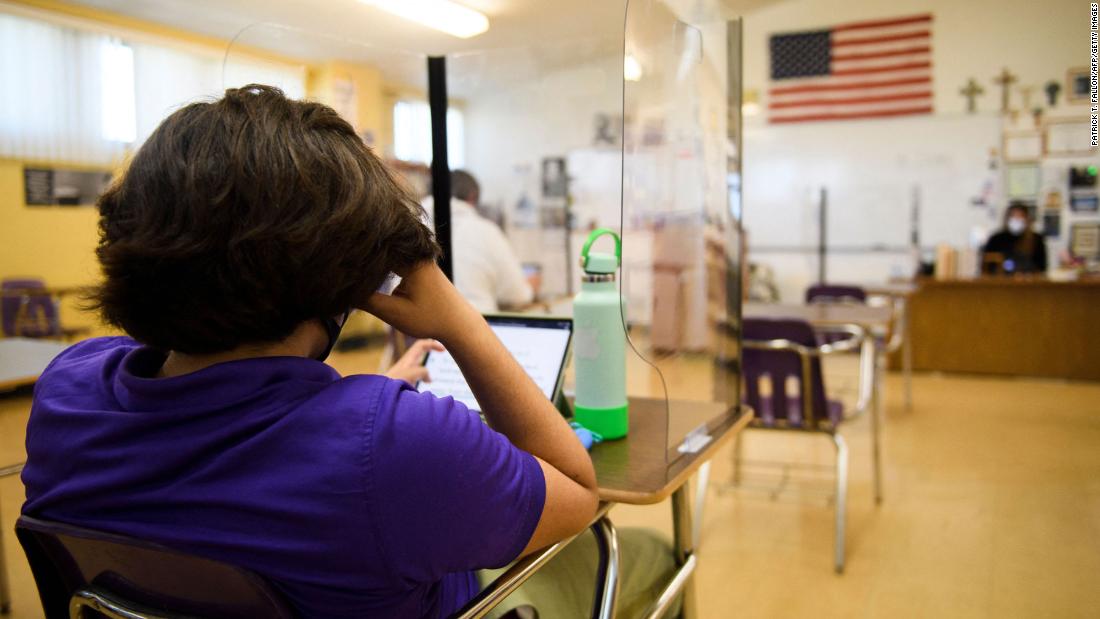FDA Authorizes New Home Use Covid-19 Test 0:38
(CNN) -
A troubling trend has emerged in recent weeks: Covid-19 cases among young people are on the rise.
In Michigan, hospitalizations among 30-year-olds have increased by more than 600% and 40-year-olds by 800%.
Average daily cases of children have also increased by more than 200%.
In Massachusetts, the largest increase in COVID-19 infections has occurred in children and adolescents.
What explains these trends?
We speak with Dr. Leana Wen, CNN Medical Analyst.
Wen is an emergency room physician and visiting professor of health policy and management at the Milken Institute School of Public Health at George Washington University.
She is also the author of the upcoming book
"Lifelines: A Doctor's Journey in the Fight for Public Health."
CNN: Help us understand these numbers. Are there any new strains that are affecting young people more? Or is it simply that young people are away from home more than before?
Dr. Leana Wen:
The disproportionate increase in cases among young people is probably due to a combination of factors.
First is the fact that older people are increasingly vaccinated and therefore very well protected against covid-19.
advertising
About 80% of all deaths have been in people over the age of 65.
In this age group, more than half are now fully vaccinated and about 75% have received at least one dose of the vaccine.
The proportion of people hospitalized is expected to be shifting more towards the young and, in fact, it shows that vaccines are working.
Another probable reason why younger people are infected is variant B.1,1.7.
This is the variant that first originated in the UK and is quickly becoming dominant here in the US Studies show that this strain is more transmissible, which means there is now an increased risk of contracting coronavirus from activities previously thought to be quite safe.
In addition to causing more cases, B.1,1.7 is now also proving to be more virulent which means it causes more serious illness and is therefore more likely to result in hospitalization and death.
Combine that with the fact that younger people are more mobile and involved in more activities, and that's probably what accounts for a higher proportion and number of cases in the younger age groups.
READ
: ANALYSIS |
Some Americans act as if the pandemic is over.
And it is not like that
CNN: What are the implications for the school? Does this mean that schools will have to close?
Wen:
Not necessarily.
There are numerous studies that have shown that schools can be some of the safest places for children if mitigation measures are implemented, notably the mandatory use of masks, but also things like keeping children in 'capsules' or cohorts , better ventilation and some degree of physical distancing.
Vaccinating teachers also protects them and reduces their likelihood of carrying the coronavirus.
Additional measures such as regular tests will also help.
That said, schools will need to be aware that there are more communicable variants, so even more of these mitigation measures need to be implemented.
Schools in the UK and Europe have had to close to deal with B.1,1.7.
Schools should be particularly attentive to extracurricular activities;
for example, in some places, extracurricular sports have been shown to spread the coronavirus.
Good contact tracing is very important to trace… the source of the virus and guide interventions appropriately.
CNN: If it's the younger age groups that are getting infected, should we prioritize them for vaccination?
Wen:
Initially, it made sense to prioritize vaccines for the elderly and chronically ill;
These are the people most likely to become seriously ill.
Prioritizing them helped save lives and avoid overwhelming our hospitals.
Vaccines are progressing rapidly and President Biden is expected to announce imminently that states must open eligibility by April 19 for all people 16 and older to qualify for vaccines.
So it's only a matter of weeks before everyone who wants a vaccine can sign up for one.
All that said, I agree with specifically increasing access to those who are most likely to contract the coronavirus and also to spread it.
Vaccination efforts should aim to make vaccination an easy and convenient option.
For example, a vaccination campaign on college campuses will bring vaccines directly to people.
Similarly, vaccines can be offered at workplaces, walk-ins.
These efforts to increase access and convenience will be really important, especially for younger people who have other priorities to attend to.
CNN: What should people do now to protect themselves, if there is a more contagious variant?
Wen:
The same precautions that we have been advising from the beginning continue to apply.
Variant B.1,1.7 spreads through the respiratory tract, just like wild-type or common strains, so continue to wear masks, maintain physical distance, and avoid indoor meetings with people who are not part of your home.
Try not to meet people indoors until you are vaccinated.
Once you are vaccinated, you can see other fully vaccinated people indoors, but until then, see people outdoors, with physical distance.
And please get vaccinated as soon as possible.
All licensed vaccines appear to be highly effective against variant B.1,1.7.
Getting vaccinated will protect you from getting sick from the coronavirus and will also reduce the likelihood that you will spread it to others.
LEE
: A third of covid-19 survivors suffer from a 'brain disease' study shows
CNN: Are there any particular precautions that children should take, since those under the age of 16 cannot yet be vaccinated?
Wen:
I would make sure that kids going back to school follow specific precautions, like wearing masks and sticking to their cohort.
Be as careful in informal and social settings as in formal school settings.
The weather is improving, so try to have play dates outside, with kids wearing masks, rather than indoors.
Know that children tend to get sick much less than adults, but some children have become seriously ill, and tragically, some have died from COVID-19.
Children under 16 can't get vaccinated yet, but [for] parents and those around children, getting vaccinated helps protect them.
The end is not that far off and the summer is expected to be much better in terms of infection level.
Therefore, continue to take precautions to protect your children and your family.
Covid-19














